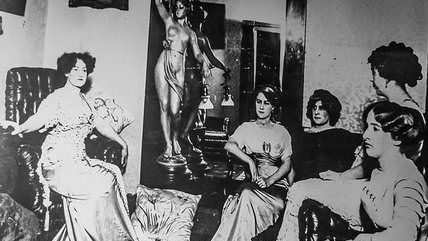In Seattle, Crime of 'Patronizing a Prostitute' Redefined as 'Sexual Exploitation'
'Words matter,' said Seattle City Attorney Pete Holmes.


In Seattle, "patronizing a prostitute" will no longer be a crime. But the Seattle City Council didn't suddenly succumb to a libertarian streak: Paying for sexual services will still be illegal, it's just been rechristened as a crime of "sexual exploitation."
"Words matter," said City Attorney Pete Holmes in a press release about the name change. "Using prostitute as a noun is demeaning and this change also reflects our more modern understanding that prostitution has lots of unwilling participants."
Words do matter, which is why sex work activists have been campaigning the Associated Press to change the term from "prostitute" to "sex worker" in The AP Stylebook, the sort of official journalistic-style bible. Part of the appeal of the term sex worker is that it succinctly characterizes the situation—someone putting in labor to provide romantic or sexual companionship, fantasy, and acts—without the negative historical connotation of words like prostitute and hooker. A common refrain in sex-work activism circles is that "sex work is work"—a way to make a living, not a pathology or party or crying shame.
Another part of the appeal of "sex worker" is that it implies agency. If someone is forced into labor (of whatever sort), we don't usually call them "workers." We call them "slaves" (or victims of trafficking). While a "prostitute" can be someone selling sex willingly or someone forced into it, the term "sex worker" helps differentiate those who choose to work in the sex industry from sex-trafficking victims. And this is the difference most people care about; consent is the crux of the matter.
Politicians and law enforcement know this. As long as it's not in their view, most Americans don't really care whether consenting adults are privately exchanging sex for money. But they do (and should!) care about individuals being forced into sex. By conflating the two, officials can prey on people's very natural and right objection to sex trafficking to expand police and prosecutorial power.
Sound like libertarian paranoia? Soon, the Washington state legislature will consider a bill changing purchasing sex from a simple misdemeanor to a gross misdemeanor, thereby increasing the maximum penalty from 90 days to one year jail time. Would most people support a one-year jail sentence for trying to buy sex? Would they support it for someone guilty of "sexual exploitation?"
Words matter.
"As somebody very leery of using the criminal-justice system to curb human behavior when it comes to sex," Melinda Chateauvert, author of Sex Workers Unite! and a retired history professor, told The Seattle Times, "I find this very disconcerting that we want to punish men for having sex, especially when the women are consenting and wanting money."
City Attorney Holmes claims the city simply wants to shed "demeaning" language and help out "prostituted persons". Perhaps that's really what Seattle City Council members think they're doing. But refusing to differentiate—conceptually or legally—between those who willingly sell sex and those who are sexually exploited just makes it harder to help the exploited, both by diverting resources and by creating a climate where all sexual trade must take place underground. Refusing to differentiate doesn't help.
It does however, expose a lot more people to arrest, prosecution, and prison sentences. If none of them actually happen to be sex traffickers… well, tomato, to-mah-to, right? Holmes told The Seattle Times that upgrading the state law to make purchasing sex a gross misdeameanor would really "give us an even bigger hammer." Size matters, too, I guess.


Show Comments (270)